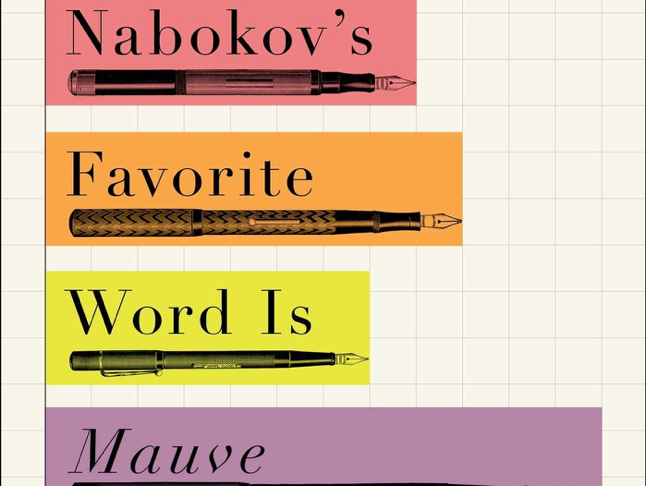
Every now and then, you happen upon a book that is just a pure delight. That's what happened to me when I opened Nabokov's Favorite Word Is Mauve by Ben Blatt. I'm not usually a numbers person, but Blatt's use of data to analyze the world's best authors had me hooked from the first page. I laughed, I gasped, I finished reading it and immediately started reading it again (a sure sign that I love a book).
In Nabokov’s Favorite Word Is Mauve, statistician and journalist Ben Blatt marries data with literature, exploring the works of the world's greatest writers. He assembles a database of thousands of books and hundreds of millions of words, and starts asking the questions that have intrigued curious word nerds and book lovers like you and I for generations: What are our favorite authors’ favorite words? Do men and women write differently? Are bestsellers getting dumber over time? Which bestselling writer uses the most clichés?
If you're looking for a light-hearted, yet informative read, I highly recommend picking up a copy for yourself. If you're short on time or just want to see the highlights, I've synthesized five of my favorite takeaways below.
Men Only Care About Men
Of all the statistics in this book, one surprised me more than any: women write about men more than men write about women. Shocking, yes?
In news that isn't really news, Blatt discovered that, while female authors use the words "he" and "she" just about equally in their work, male authors use the word "he" three times as much as they use the word "she."
Another fun fact: male authors of classic literature are also three times as likely to write that a female character "interrupted" someone than that male characters did the same. Thankfully, this trend has reduced in modern literature (but it's still present).
These Authors Are Head Over Heels In Love With Cliches
One of the statistics Blatt examined was use of cliches per 100,000 words. Here, too, Blatt discovered a difference between male and female authors. The five authors who used the most cliches were, in order:
- Chuck Palahniuk (129 cliches per 100,000 words)
- Salman Rushdie (131 cliches per 100,000 words)
- Kurt Vonnegut (140 cliches per 100,000 words)
- Tom Wolfe (143 cliches per 100,000 words)
- James Patterson (160 cliches per 100,000 words)
Notice anything? Yeah: they're all men!
The five authors who used the fewest cliches, on the other hand? All women.
- Veronica Roth (69 cliches per 100,00 words)
- Willa Cather (67 cliches per 100,00 words)
- Virginia Woolf (62 cliches per 100,00 words)
- Edith Wharton (62 cliches per 100,00 words)
- Jane Austen (45 cliches per 100,00 words)
The Road To Hell Really Is Paved With Adverbs
Stephen King famously said that the road to Hell is paved with adverbs. Ben Blatt, it seems, has never been to hell, but he has analyzed the works of the world's foremost authors. What he found was that excessive adverb usage does get authors sent to hell: the literary hell of bad reviews, that is.
Blatt examined all 167 books written by consensus "great" authors like Hemingway, Cather, Rand, Morrison, Joyce, and others. Blatt didn't just look at the books they wrote that made them famous; he also examined their lesser known and poorly reviewed works.
Blatt found that the books with the fewest adverbs (0 - 49 per 10,000 words) were considered great by 67% of critics. Books that had a higher percentage of adverbs (150+ per 10,000 words) received favorable reviews just 16% of the same.
Time to run the Style Report!
Our Favorite Authors' Favorite Words
Blatt crunched a bunch of numbers to determine authors' favorite words. First, he determined which words authors used more frequently than the rate at which they typically appear in writing (compared to a huge sample of literary works written in English between 1810 and 2009, assembled by linguists at Brigham Young University).
From there, Blatt narrowed down authors' top three favorite words using the following criteria:
The favorite word...
- Must occur in at least half of the author's books
- Must be used at a rate of at least once per 100,000 words
- Must not be so obscure that it's used less than once per million in the BYU sample of written English
- Must not be a proper noun
Here are some of the favorite words Blatt found:
- Truman Capote: clutter, zoo, geranium
- Agatha Christie: inquest, alibi, frightful
- F. Scott Fitzgerald: facetious, muddled, sanitarium
- Vladimir Nabokov: mauve (duh), banal, pun
- J.K. Rowling: wand, wizard, potion (also duh)
- Amy Tan: gourd, peanut, noodles (now I'm hungry!)
- Mark Twain: hearted, shucks, satan
If It Ain't Broke....
My final favorite takeaway is this:
Best-selling author Danielle Steel mentions the weather in the first sentence of 46% of her books.
If you find something that works for you... go with it!

